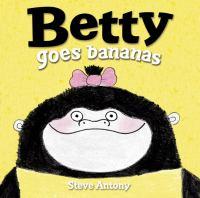
Talking is like breathing - we do it countless times every day without thinking. Of course, that was not always the case. You had to learn your language, and the way you did that was listening to other people (most likely your parents and other adults in your family) in everyday situations. For example, your father asked if you wanted a snack, and you pointed to the yellow pointy thing on the counter. He said, "Banana! You want a banana to eat for your snack?" Your brain started to encode the sounds "ba-na-na" as representing the delicious yellow fruit, so the next time you saw it (or wanted to eat it), you probably said something like, "na-na!" (Eventually, you became sophisticated enough to say all of the syllables, but oh, how your parents probably missed your earlier, far cuter pronunciation!)
One way to expand on that simple word recognition to include other words related to "banana" is to read a book like "Betty Goes Bananas" to your child - about a gorilla who gets mad when she can't figure out how to peel her banana. As you read the book and talk about Betty's dilemma, your child will start to relate bananas to monkeys, and may begin to understand that it must be peeled to be eaten, and exactly how the peeling happens.
This is how language is learned. It is also how knowledge of the world develops. That's why early literacy experts say "Word knowledge is world knowledge." In other words, the more words you share with your children, particularly in reading a wide variety of books, the more they will start to understand things like rocket ships and road construction, penguins and pies - literally, every thing in the world.
The next time you talk with your child, stop and think: "What words am I giving? What WORLDS?" and be sure to congratulate yourself for teaching them language. Then maybe go eat a banana.
Laura Raphael, Children's Services Coordinator, Tulsa City-County Library